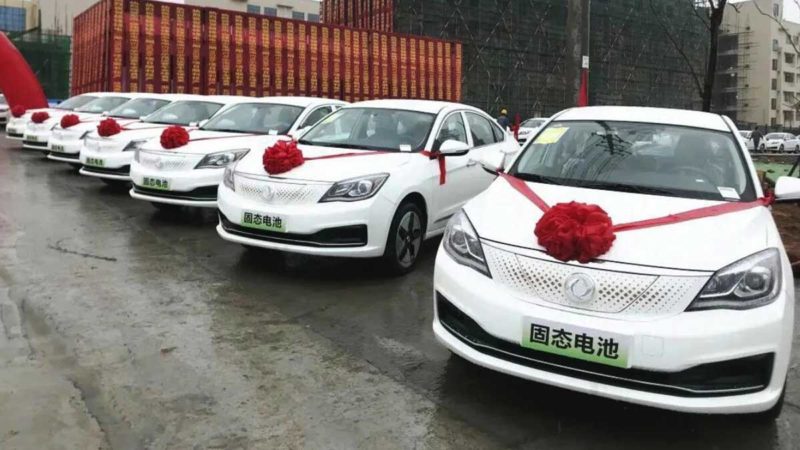In what could be described as something of a ground-breaking moment, Dongfeng Motor has delivered 50 electric cars with solid-state batteries for demonstration in China.
The difference between a traditional battery and a solid-state battery is in its electrolyte: by using a solid material for the electrolyte between the anode and the cathode, battery makers can increase energy density (and therefore driving range), or reduce battery weight.
They are considered something of a holy grail for the EV industry, and solid-state batteries also have fewer production processes, can charge more quickly and have a longer life than batteries with liquid electrolytes.
However, despite years of research, there have been no EVs with solid-state batteries released to the market to date. While Nio announced in early January 2021 it would start making EVs with 150kWh solid-state batteries, it does not plan to bring these to market until the fourth quarter of this year.
The new DongFeng Aeolus E70 EVs use solid-state batteries developed jointly with Ganfeng Lithium, which cut a deal with the state-owned carmaker in mid-2021.
The Ganfeng solid-state batteries utilise an advanced flexible diaphragm technology that allows lithium ions to travel between the electrodes while inhibiting lithium dendrites in the solid-state batteries inside E70 (it is the formation of dendrites that degrades battery capacity and life).
It was reported by Chinese media on Saturday that the first batch of 50 Dongfeng Fengshen E70s with solid-state batteries will be put into service as demonstration vehicles in the Jiangxi, Guangzhou, Zhejiang and Jiangsu provinces.
According to the agency, the solid-state battery module which was first unveiled in December adopts aluminum alloy frame and high-precision seam laser welding technology to reduce redundant structure. Combining with an optimised battery management system, a stable and reliable solid-state battery management system has been formed.
Media reports say that Ganfeng Lithium has undertaken safety testing of the new solid-state battery system and that it withstood the harsh experimental environment in terms of waterproof, explosion-proof, earthquake resistance, and structural strength.
As one of China’s “big four” automakers alongside SAIC, Changan and FAW, Dongfeng is also known in the west for its joint venture with Nissan under the Dongfeng Nissan name. It also has JVs with Renault, Honda, and Peugeot-Citroën.
Other carmakers undertaking collaborations to achieve commercially produced solid-state batteries for EVs include Mercedes-Benz, which in December joined with Factorial Energy, BMW/Ford with Solid Power, and Volkswagen in its partnership with battery startup QuantumScape.
However, although the latter hailed a “major breakthrough” in late 2020, progress has been slow, and its market value has shed some 30%+ value since the start of 2022.
The success of Dongfeng’s solid-state batteries will be something also to keep an eye on, as will be its foray into battery swapping after its first battery swap station opened in Hunan province in mid-January.

Bridie Schmidt is associate editor for The Driven, sister site of Renew Economy. She has been writing about electric vehicles since 2018, and has a keen interest in the role that zero-emissions transport has to play in sustainability. She has participated in podcasts such as Download This Show with Marc Fennell and Shirtloads of Science with Karl Kruszelnicki and is co-organiser of the Northern Rivers Electric Vehicle Forum. Bridie also owns a Tesla Model Y and has it available for hire on evee.com.au.

